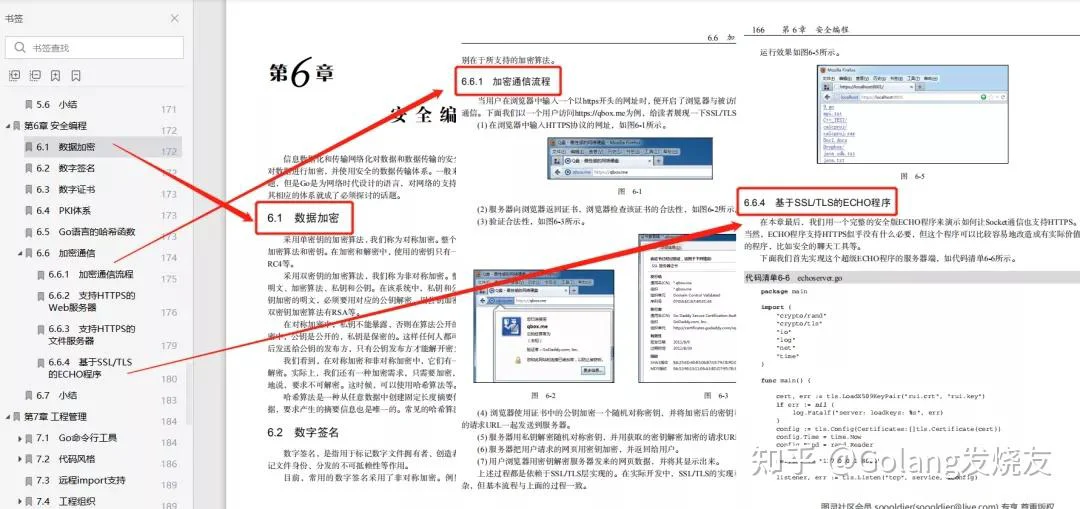作者 | Leo叔叔 ;责编 | 欧阳姝黎
sync.Poolsync.PoolGoPoolTalk is cheap,Show me your code
因为Go1.13版本后对sync.Pool做了优化,放弃了利用sync.Mutex加锁的方式该用CAS加带环形数组的双向链表的方式来实现,本文基于Go1.15.8最新稳定版本分析。
基本使用
package main
import "sync"
type Person struct {
Age int
}
// 初始化pool
var personPool = sync.Pool{
New: func() interface{} {
return new(Person)
},
}
func main() {
// 获取一个实例
newPerson := personPool.Get().(*Person)
// 回收对象 以备其他协程使用
defer personPool.Put(newPerson)
newPerson.Age = 25
}
使用起来比较简单大概分三步:
PoolGetPutsync.Mutexsync.Poolsync.Poolimport (
"testing"
)
func BenchmarkWithoutPool(b *testing.B) {
var p *Person
b.ReportAllocs()
b.ResetTimer()
for i := 0; i < b.N; i++ {
for j := 0; j < 10000; j++ {
p = new(Person)
p.Age = 30
}
}
}
func BenchmarkWithPool(b *testing.B) {
var p *Person
b.ReportAllocs()
b.ResetTimer()
for i := 0; i < b.N; i++ {
for j := 0; j < 10000; j++ {
p = personPool.Get().(*Person)
p.Age = 30
personPool.Put(p)
}
}
}
基准测试结果:
BenchmarkWithoutPool
BenchmarkWithoutPool-8 7630 135523 ns/op 80000 B/op 10000 allocs/op
BenchmarkWithPool
BenchmarkWithPool-8 9865 126072 ns/op 0 B/op 0 allocs/op工作原理
没有啥一张图搞不定的
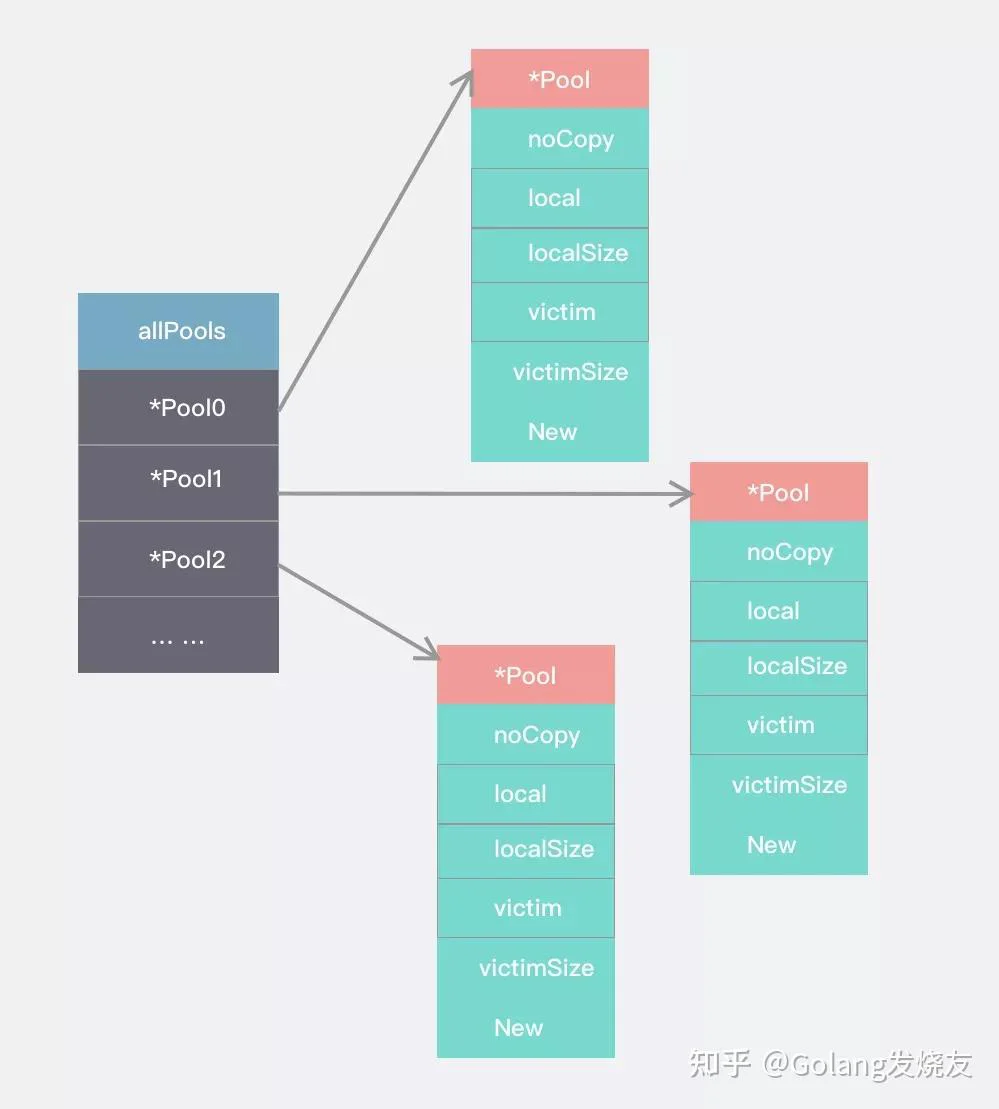
如果不行 那就再来一张
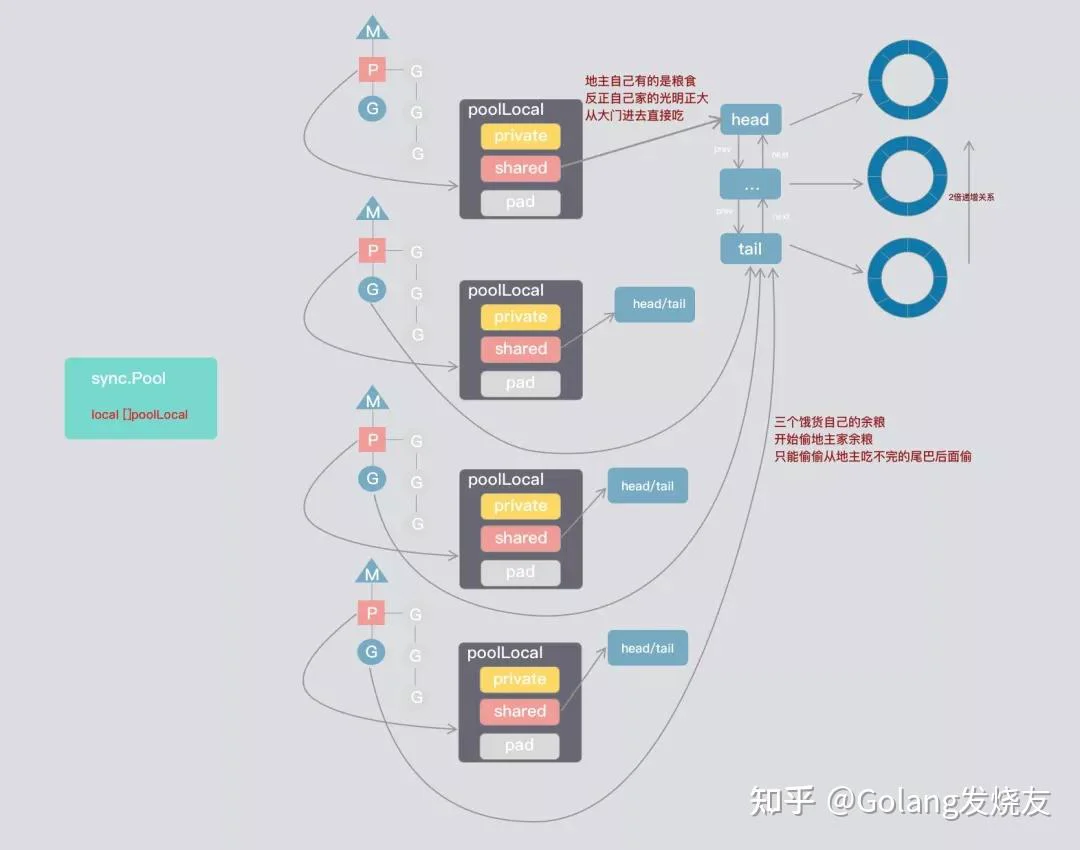
sync.Pool数据结构
type Pool struct {
noCopy noCopy
// 实际指向[]poolLocal 每个P对应一个poolLocal 数组大小取决于P的数量 runtime.GOMAXPROCS(0)
local unsafe.Pointer
localSize uintptr // []poolLocal的大小
victim unsafe.Pointer // local from previous cycle
victimSize uintptr // size of victims array
//当缓存池无对应对象时调用
New func() interface{}
}Go1.13sync.PoolvictimvictimSizesync.Poolsync.poolLocalruntime.GOMAXPROCS(0)type poolLocal struct {
poolLocalInternal
// Prevents false sharing on widespread platforms with
// 128 mod (cache line size) = 0 .
pad [128 - unsafe.Sizeof(poolLocalInternal{})%128]byte
}
// Local per-P Pool appendix.
type poolLocalInternal struct {
private interface{} // 只能被对应的P使用
shared poolChain // 本地的P可以从Head 进行pushHead/popHead 其他的P可以popTail.
}
poolLocalprivateshared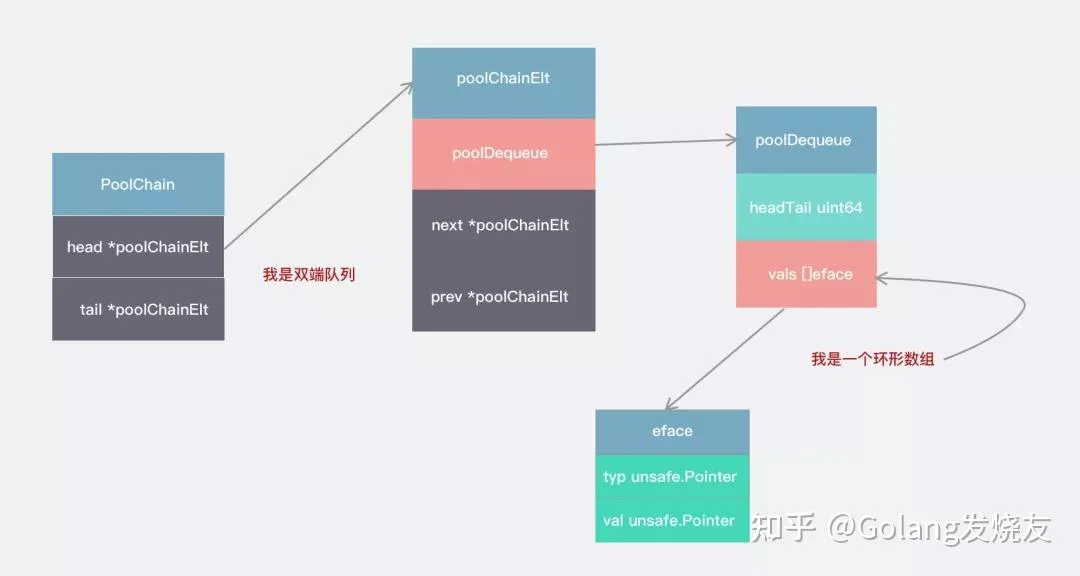
poolDequeuevalsheadTail
代码佐证:
func (d *poolDequeue) unpack(ptrs uint64) (head, tail uint32) {
const mask = 1<<dequeueBits - 1
head = uint32((ptrs >> dequeueBits) & mask)
tail = uint32(ptrs & mask)
return
}
func (d *poolDequeue) pack(head, tail uint32) uint64 {
const mask = 1<<dequeueBits - 1
return (uint64(head) << dequeueBits) |
uint64(tail&mask)
}sync.PoolpoolDequeuepoolChainElt操作方法
sync.Pool获取对象 p.Get
获取对象,大体流程:
goroutinePruntime_procPinpoolLocalidfunc (p *Pool) Get() interface{} {
// 将当前goroutine与P进行绑定 runtime_procPin禁用抢占
// 返回poolLocal与P的id
l, pid := p.pin()
x := l.private //尝试直接从私有空间拿
l.private = nil
if x == nil {
//从共享区域头部拿
x, _ = l.shared.popHead()
if x == nil {
//直接实在没有 尝试去别人那边看看能不能偷个
x = p.getSlow(pid)
}
}
// 解除抢占禁用
runtime_procUnpin()
// 都没有 那只好自己New一个
if x == nil && p.New != nil {
x = p.New()
}
return x
}那么我们来看看goroutine 是怎么跟P绑定的
func (p *Pool) pin() (*poolLocal, int) {
pid := runtime_procPin()
// pinSlow中我们先存储local再存储localSize,这里我们以相反顺序加载
// 因为我们已经禁用了抢占 GC这期间不会发生 因此我们需要观察local的大小至少跟localSize一样
s := atomic.LoadUintptr(&p.localSize) // load-acquire
l := p.local // load-consume
if uintptr(pid) < s {
return indexLocal(l, pid), pid
}
// 运行过程中可能会存在调整P的情况 或者GC了
return p.pinSlow()
}runtime_procPin()番外:禁止抢占
func runtime_procPin() int
//go:linkname sync_runtime_procPin sync.runtime_procPin
//go:nosplit
func sync_runtime_procPin() int {
return procPin()
}
//go:nosplit
func procPin() int {
_g_ := getg()
mp := _g_.m
mp.locks++
return int(mp.p.ptr().id)
}procPinprocPingoroutinegorountinelocksgoroutinemGo runtimeP- 第一种情况,进行系统调用的G,因为存在阻塞,傻傻等在那里会比较浪费计算资源,为了让其他goroutine不被饿死
- 第二种情况,如果一个G运行时间太长,P中其他G得不到执行也会饿死
抢占实现
Gosysmonruntime.mainsysmonGPMGMsysmonnetpoolretakeforcegcscavengeheapretake//go:nowritebarrierrec
func sysmon() {
...
// retake P's blocked in syscalls
// and preempt long running G's
if retake(now) != 0 {
idle = 0
} else {
idle++
}
...
}
func retake(now int64) uint32 {
...
if s == _Prunning || s == _Psyscall {
// Preempt G if it's running for too long.
t := int64(_p_.schedtick)
if int64(pd.schedtick) != t {
pd.schedtick = uint32(t)
pd.schedwhen = now
} else if pd.schedwhen+forcePreemptNS <= now {//G运行时间超过forcePreemptNS
preemptone(_p_)
// In case of syscall, preemptone() doesn't
// work, because there is no M wired to P.
sysretake = true
}
...
}GforcePreemptNS(10ms)preemptone(_p_)Pfunc preemptone(_p_ *p) bool {
mp := _p_.m.ptr()
if mp == nil || mp == getg().m {
return false
}
gp := mp.curg
if gp == nil || gp == mp.g0 {
return false
}
gp.preempt = true
// Every call in a go routine checks for stack overflow by
// comparing the current stack pointer to gp->stackguard0.
// Setting gp->stackguard0 to StackPreempt folds
// preemption into the normal stack overflow check.
gp.stackguard0 = stackPreempt
// Request an async preemption of this P.
if preemptMSupported && debug.asyncpreemptoff == 0 {
_p_.preempt = true
preemptM(mp)
}
return true
} gp.preemptgp.stackguard0goroutinestackguard0(1<<(8*sys.PtrSize) - 1)& -1314PGstackguard0SPmorestack//以asm_amd64.s为例
TEXT runtime·morestack(SB),NOSPLIT,$0-0
... ...
// Call newstack on m->g0's stack.
MOVQ m_g0(BX), BX
MOVQ BX, g(CX)
MOVQ (g_sched+gobuf_sp)(BX), SP
CALL runtime·newstack(SB)
CALL runtime·abort(SB) // crash if newstack returns
RETmorestacknewstack//go:nowritebarrierrec
func newstack() {
... ...
if preempt {
if !canPreemptM(thisg.m) {
// Let the goroutine keep running for now.
// gp->preempt is set, so it will be preempted next time.
gp.stackguard0 = gp.stack.lo + _StackGuard
gogo(&gp.sched) // never return
}
}
... ...
}
//go:nosplit
func canPreemptM(mp *m) bool {
return mp.locks == 0 && mp.mallocing == 0 && mp.preemptoff == "" && mp.p.ptr().status == _Prunning
}newstackmp.locks!=0gopreempt_m(gp)goschedImpl(gp)goroutinecasgstatus(gp_Grunning, _Grunnable)goroutineruntime_procPingoroutinemlocks但是还有个问题,为啥GC也拿它没办法?
GoGCruntime.sysmonruntime.forcegchelperruntime.mallocgcgcStart(trigger gcTrigger)func stopTheWorldWithSema() {
_g_ := getg()
// If we hold a lock, then we won't be able to stop another M
// that is blocked trying to acquire the lock.
if _g_.m.locks > 0 {
throw("stopTheWorld: holding locks")
}
lock(&sched.lock)
sched.stopwait = gomaxprocs
atomic.Store(&sched.gcwaiting, 1)
preemptall()
// stop current P
_g_.m.p.ptr().status = _Pgcstop // Pgcstop is only diagnostic.
sched.stopwait--
// try to retake all P's in Psyscall status
for _, p := range allp {
s := p.status
if s == _Psyscall && atomic.Cas(&p.status, s, _Pgcstop) {
if trace.enabled {
traceGoSysBlock(p)
traceProcStop(p)
}
p.syscalltick++
sched.stopwait--
}
}
// stop idle P's
for {
p := pidleget()
if p == nil {
break
}
p.status = _Pgcstop
sched.stopwait--
}
wait := sched.stopwait > 0
unlock(&sched.lock)
// wait for remaining P's to stop voluntarily
if wait {
for {
// wait for 100us, then try to re-preempt in case of any races
if notetsleep(&sched.stopnote, 100*1000) {
noteclear(&sched.stopnote)
break
}
preemptall()
}
}
// sanity checks
bad := ""
if sched.stopwait != 0 {
bad = "stopTheWorld: not stopped (stopwait != 0)"
} else {
for _, p := range allp {
if p.status != _Pgcstop {
bad = "stopTheWorld: not stopped (status != _Pgcstop)"
}
}
}
if atomic.Load(&freezing) != 0 {
// Some other thread is panicking. This can cause the
// sanity checks above to fail if the panic happens in
// the signal handler on a stopped thread. Either way,
// we should halt this thread.
lock(&deadlock)
lock(&deadlock)
}
if bad != "" {
throw(bad)
}
}preemptall()PPPPstopPPpreemptall()func preemptall() bool {
res := false
for _, _p_ := range allp {
if _p_.status != _Prunning {
continue
}
if preemptone(_p_) {
res = true
}
}
return res
} preemptone(_p_)GCSTWGCruntime_procPinruntime_procUnpingoroutinePPidpidfunc indexLocal(l unsafe.Pointer, i int) *poolLocal {
lp := unsafe.Pointer(uintptr(l) + uintptr(i)*unsafe.Sizeof(poolLocal{}))
return (*poolLocal)(lp)
} Pp.pinSlow()func (p *Pool) pinSlow() (*poolLocal, int) {
// Retry under the mutex.
// Can not lock the mutex while pinned.
runtime_procUnpin()
allPoolsMu.Lock()
defer allPoolsMu.Unlock()
pid := runtime_procPin()
// poolCleanup won't be called while we are pinned.
s := p.localSize
l := p.local
if uintptr(pid) < s {
return indexLocal(l, pid), pid
}
if p.local == nil {
allPools = append(allPools, p)
}
// If GOMAXPROCS changes between GCs, we re-allocate the array and lose the old one.
size := runtime.GOMAXPROCS(0)
local := make([]poolLocal, size)
atomic.StorePointer(&p.local, unsafe.Pointer(&local[0])) // store-release
atomic.StoreUintptr(&p.localSize, uintptr(size)) // store-release
return &local[pid], pid
}pinSlow()PallPoolsMu Mutexuintptr(pid) < sallPools []*PoolGCvictimpoolLocalprivatex, _ = l.shared.popHead()func (c *poolChain) popHead() (interface{}, bool) {
d := c.head
for d != nil {
if val, ok := d.popHead(); ok {
return val, ok
}
// There may still be unconsumed elements in the
// previous dequeue, so try backing up.
d = loadPoolChainElt(&d.prev)
}
return nil, false
}PoolChainEltprevd.popHead()func (d *poolDequeue) popHead() (interface{}, bool) {
var slot *eface
for {
ptrs := atomic.LoadUint64(&d.headTail)
head, tail := d.unpack(ptrs)
if tail == head {
// Queue is empty.
return nil, false
}
// Confirm tail and decrement head. We do this before
// reading the value to take back ownership of this
// slot.
head--
ptrs2 := d.pack(head, tail)
if atomic.CompareAndSwapUint64(&d.headTail, ptrs, ptrs2) {
// We successfully took back slot.
slot = &d.vals[head&uint32(len(d.vals)-1)]
break
}
}
val := *(*interface{})(unsafe.Pointer(slot))
if val == dequeueNil(nil) {
val = nil
}
// Zero the slot. Unlike popTail, this isn't racing with
// pushHead, so we don't need to be careful here.
*slot = eface{}
return val, true
}逻辑也比较简单
headTail2.2 接着将head索引减1,然后将head、tail再打包回去,通过CAS判断当前没有并发修改就拿到数据 跳出循环 否则循环等待
2.3 将slot转为interface{}类型
2.4 将slot赋值为eface{}
Pp.getSlow(pid)func (p *Pool) getSlow(pid int) interface{} {
// See the comment in pin regarding ordering of the loads.
size := atomic.LoadUintptr(&p.localSize) // load-acquire
locals := p.local // load-consume
// Try to steal one element from other procs.
for i := 0; i < int(size); i++ {
l := indexLocal(locals, (pid+i+1)%int(size))
if x, _ := l.shared.popTail(); x != nil {
return x
}
}
// Try the victim cache. We do this after attempting to steal
// from all primary caches because we want objects in the
// victim cache to age out if at all possible.
size = atomic.LoadUintptr(&p.victimSize)
if uintptr(pid) >= size {
return nil
}
locals = p.victim
l := indexLocal(locals, pid)
if x := l.private; x != nil {
l.private = nil
return x
}
for i := 0; i < int(size); i++ {
l := indexLocal(locals, (pid+i)%int(size))
if x, _ := l.shared.popTail(); x != nil {
return x
}
}
// Mark the victim cache as empty for future gets don't bother
// with it.
atomic.StoreUintptr(&p.victimSize, 0)
return nil
} l.shared.popTail() func (c *poolChain) popTail() (interface{}, bool) {
d := loadPoolChainElt(&c.tail)
if d == nil {
return nil, false
}
for {
// It's important that we load the next pointer
// *before* popping the tail. In general, d may be
// transiently empty, but if next is non-nil before
// the pop and the pop fails, then d is permanently
// empty, which is the only condition under which it's
// safe to drop d from the chain.
d2 := loadPoolChainElt(&d.next)
if val, ok := d.popTail(); ok {
return val, ok
}
if d2 == nil {
// This is the only dequeue. It's empty right
// now, but could be pushed to in the future.
return nil, false
}
// The tail of the chain has been drained, so move on
// to the next dequeue. Try to drop it from the chain
// so the next pop doesn't have to look at the empty
// dequeue again.
if atomic.CompareAndSwapPointer((*unsafe.Pointer)(unsafe.Pointer(&c.tail)), unsafe.Pointer(d), unsafe.Pointer(d2)) {
// We won the race. Clear the prev pointer so
// the garbage collector can collect the empty
// dequeue and so popHead doesn't back up
// further than necessary.
storePoolChainElt(&d2.prev, nil)
}
d = d2
}
}nextPoolChainEltd.popTail()func (d *poolDequeue) popTail() (interface{}, bool) {
var slot *eface
for {
ptrs := atomic.LoadUint64(&d.headTail)
head, tail := d.unpack(ptrs)
if tail == head {
// Queue is empty.
return nil, false
}
ptrs2 := d.pack(head, tail+1)
if atomic.CompareAndSwapUint64(&d.headTail, ptrs, ptrs2) {
slot = &d.vals[tail&uint32(len(d.vals)-1)]
break
}
}
val := *(*interface{})(unsafe.Pointer(slot))
if val == dequeueNil(nil) {
val = nil
}
slot.val = nil
atomic.StorePointer(&slot.typ, nil)
return val, true
}popHeadheadTailpopHeadatomic.StorePointer(&slot.typ, nil)pushHeadpopTail3.2 那如果偷都偷不到,会进行以下操作
size = atomic.LoadUintptr(&p.victimSize)
if uintptr(pid) >= size {
return nil
}
locals = p.victim
l := indexLocal(locals, pid)
if x := l.private; x != nil {
l.private = nil
return x
}
for i := 0; i < int(size); i++ {
l := indexLocal(locals, (pid+i)%int(size))
if x, _ := l.shared.popTail(); x != nil {
return x
}
}
// Mark the victim cache as empty for future gets don't bother
// with it.
atomic.StoreUintptr(&p.victimSize, 0)victim cache受害者缓存是由Norman Jouppi提出的一种提高缓存性能的硬件技术。如他的论文所述
Miss caching places a fully-associative cache between cache and its re-fill path. Misses in the cache that hit in the miss cache have a one cycle penalty, as opposed to a many cycle miss penalty without the miss cache. Victim Caching is an improvement to miss caching that loads the small fully-associative cache with victim of a miss and not the requested cache line.
大概意思就是在旧缓存和缓解重建的过程中,添加一个全关联的缓存(保存旧缓存数据)。也就是说当一级缓存踢出的数据,放到受害者缓存中。当我们在一级缓存未命中,则可以继续尝试从受害者缓存中查询。
如代码:
size = atomic.LoadUintptr(&p.victimSize)
if uintptr(pid) >= size {
return nil
}
locals = p.victim
l := indexLocal(locals, pid)
if x := l.private; x != nil {
l.private = nil
return x
}
for i := 0; i < int(size); i++ {
l := indexLocal(locals, (pid+i)%int(size))
if x, _ := l.shared.popTail(); x != nil {
return x
}
}
// Mark the victim cache as empty for future gets don't bother
// with it.
atomic.StoreUintptr(&p.victimSize, 0)如果能理解,其实还是挺简单的,也就是
local1 ->GC ->local2 victim->local1
Local2 ->GC ->local3 victim->local2
- 很遗憾getSlow也没拿到 那只好自己手动new一个了
if x == nil && p.New != nil {
x = p.New()
}用完返回Pool p.Put
GetPutfunc (p *Pool) Put(x interface{}) {
if x == nil {
return
}
// 将goroutine与P绑定 runtime_procPin禁用抢占 返回poolLocal
l, _ := p.pin()
if l.private == nil {//优先放到私有空间
l.private = x
x = nil
}
if x != nil { //放回共享空间
l.shared.pushHead(x)
}
// 解除抢占禁用
runtime_procUnpin()
} 基本逻辑:
p.pinpoolLocalfunc (c *poolChain) pushHead(val interface{}) {
d := c.head
if d == nil {
// Initialize the chain.
const initSize = 8 // Must be a power of 2
d = new(poolChainElt)
d.vals = make([]eface, initSize)
c.head = d
storePoolChainElt(&c.tail, d)
}
if d.pushHead(val) {
return
}
newSize := len(d.vals) * 2
if newSize >= dequeueLimit {
// Can't make it any bigger.
newSize = dequeueLimit
}
d2 := &poolChainElt{prev: d}
d2.vals = make([]eface, newSize)
c.head = d2
storePoolChainElt(&d.next, d2)
d2.pushHead(val)
}putHead逻辑主要是将对象放到双向链表的对应节点的环形数组中。
先获取双向链表的head节点
若head节点为空 则初始化head节点 节点对应环形数组初始大小为8
将对象放到环形数组中
func (d *poolDequeue) pushHead(val interface{}) bool {
ptrs := atomic.LoadUint64(&d.headTail)
head, tail := d.unpack(ptrs)
if (tail+uint32(len(d.vals)))&(1<<dequeueBits-1) == head {
// Queue is full.
return false
}
slot := &d.vals[head&uint32(len(d.vals)-1)]
typ := atomic.LoadPointer(&slot.typ)
if typ != nil {// popTail可能还没处理完
return false
}
// The head slot is free, so we own it.
if val == nil {
val = dequeueNil(nil)
}
*(*interface{})(unsafe.Pointer(slot)) = val
atomic.AddUint64(&d.headTail, 1<<dequeueBits)
return true
}popHeadpushHeadpopTailslot.typpopTail关于GC清除数据问题
pool.gogcTriggergcStart()clearpools()poolCleanup()func init() {
runtime_registerPoolCleanup(poolCleanup)
}
//go:linkname sync_runtime_registerPoolCleanup sync.runtime_registerPoolCleanup
func sync_runtime_registerPoolCleanup(f func()) {
poolcleanup = f
}
func poolCleanup() {
for _, p := range oldPools {
p.victim = nil
p.victimSize = 0
}
for _, p := range allPools {
p.victim = p.local
p.victimSize = p.localSize
p.local = nil
p.localSize = 0
}
oldPools, allPools = allPools, nil
} victim最后的最后,细心的你可能发现 还遗漏了两个细节
noCopy
sync.PoolnoCopysync.PoolGogo vet举个例子
type noCopy struct{}
// Lock is a no-op used by -copylocks checker from `go vet`.
func (*noCopy) Lock() {}
func (*noCopy) Unlock() {}
type People struct {
noCopy noCopy
}
func say(p People) {
}
func main() {
var p People
say(p)
}go vet demo.go输出:
# command-line-arguments
./demo.go:12:12: say passes lock by value: command-line-arguments.People contains command-line-arguments.noCopy
./demo.go:18:6: call of say copies lock value: command-line-arguments.People contains command-line-arguments.noCopy
当然直接执行不会报任何错
pad
type poolLocal struct {
poolLocalInternal
// Prevents false sharing on widespread platforms with
// 128 mod (cache line size) = 0 .
pad [128 - unsafe.Sizeof(poolLocalInternal{})%128]byte
}pad伪共享缓存系统中我们是以缓存行(cache line)为单位,通常大小为64字节。上面这张图,我们可以看到L1、L2、L3三级缓存他们和内存的读取速度当然取决于他们与CPU紧密程度。L1>L2>L3>内存
但是!我们现在使用的都是多核CPU的计算机,如何保证多核看到的数据的一致性呢?这里我们需要谈到一个协议-MESI协议,M、E、S、I分别表示缓存行的4个状态
M(修改,Modified):本地处理器已经修改缓存行,即是脏行,它的内容与内存中的内容不一样,并且此 cache 只有本地一个拷贝(专有);
E(专有,Exclusive):缓存行内容和内存中的一样,而且其它处理器都没有这行数据;
S(共享,Shared):缓存行内容和内存中的一样, 有可能其它处理器也存在此缓存行的拷贝;
I(无效,Invalid):缓存行失效, 不能使用。
他们转换关系如下:
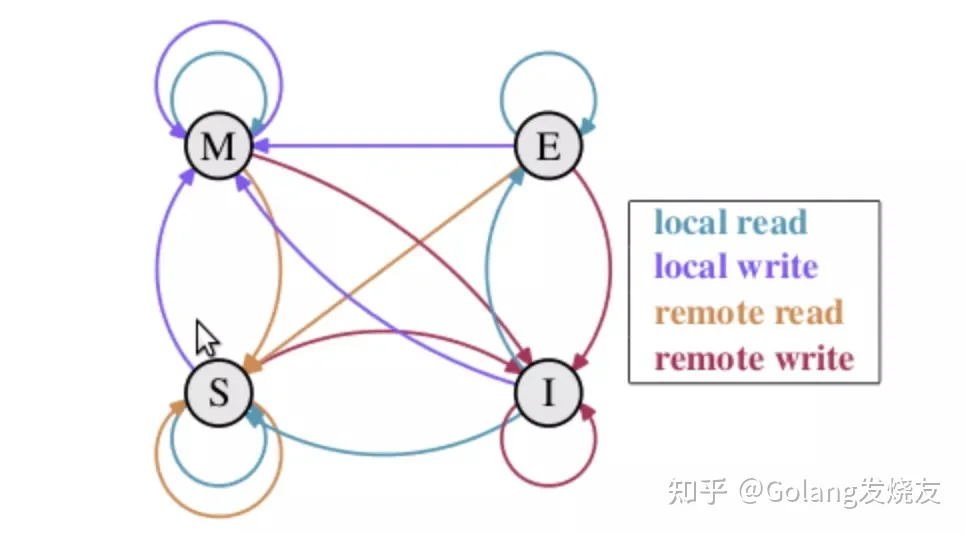
现在假设我们有以下场景
cache line怎么解决呢?
@Contended总结
sync.PoolForkJoinPool- work stealing算法
- CAS如何做到lock-free
- 设置抢占标志 禁止P被占用 并制止GC
- Victim cache 受害者缓存是怎么回事儿
- noCopy是干啥的 怎么实现禁止拷贝
- 伪共享(false share)
- Pool GC的机制
不过这也符合Go“少即是多”的设计理念。
感谢阅读,我是 @Golang发烧友
想学习更多Golang编程知识,点击下方卡片试试吧!
Go学习路线图:
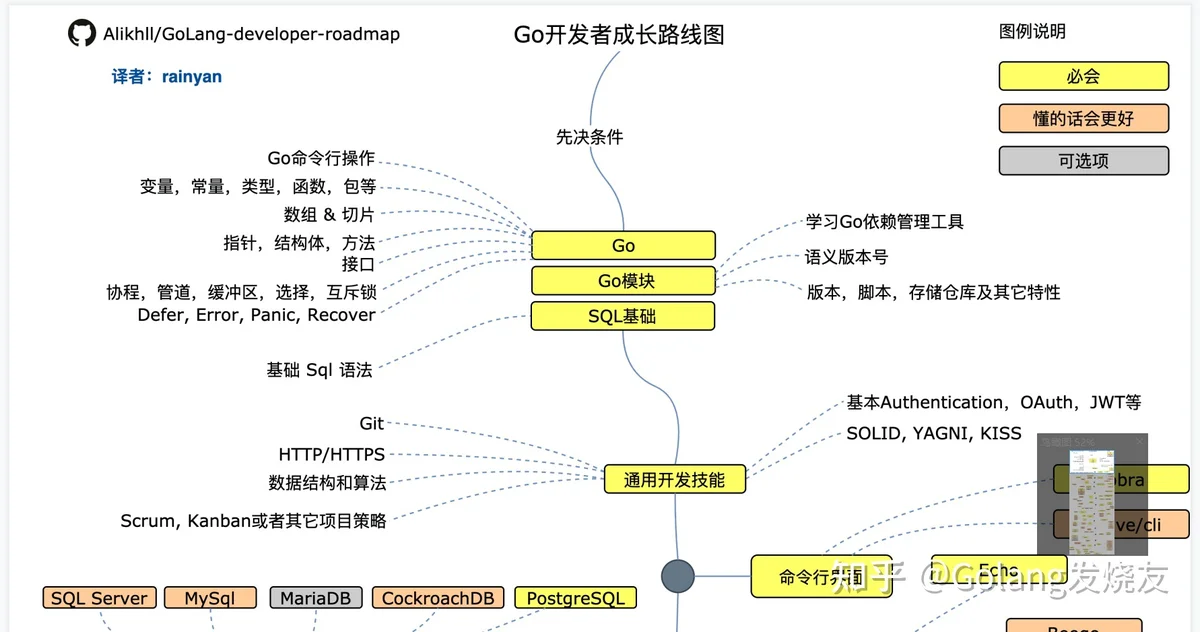
Go面试思维导图:
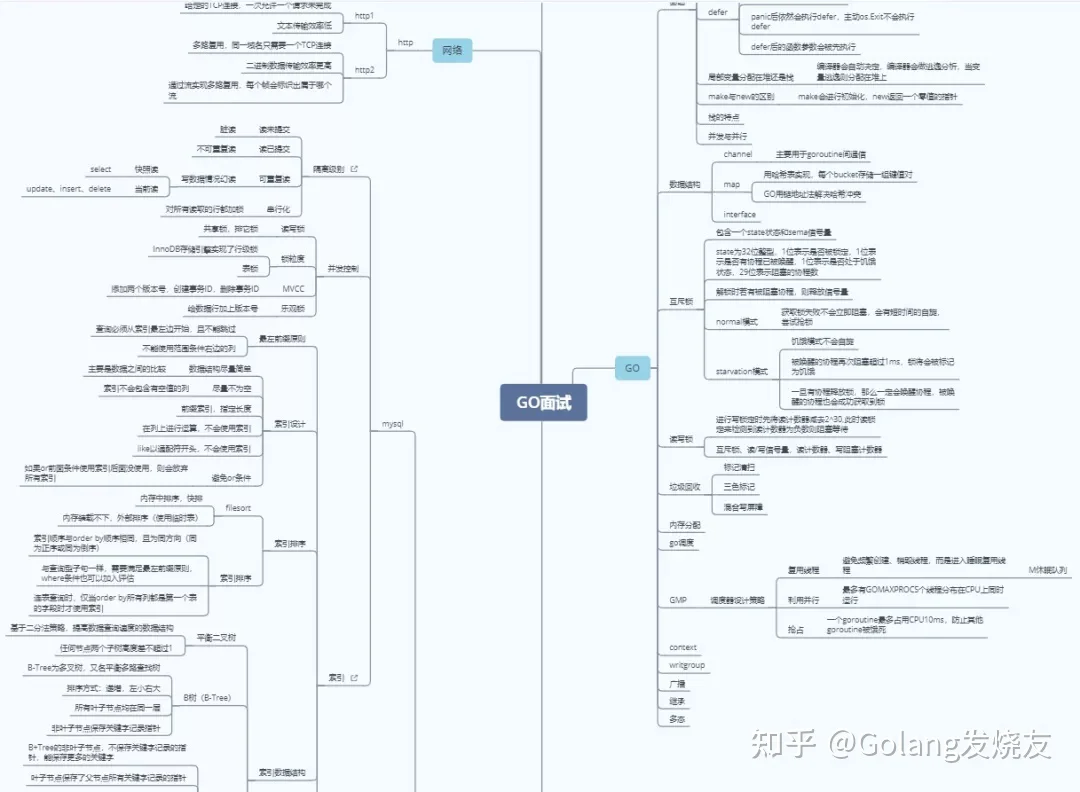
Go语言编程:
